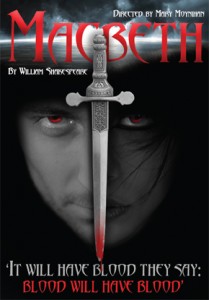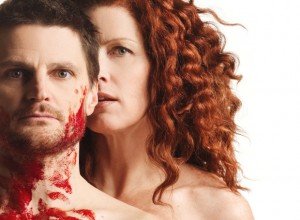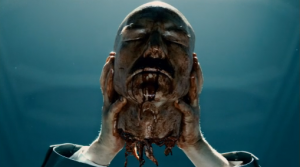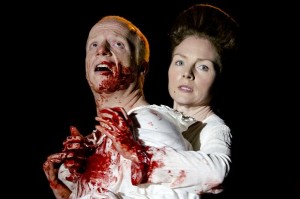 So let’s imagine for a second that you work as the Macbeths’ marriage counsellor. What would you tell them about the factors that lead to the disintegration of a relationship? And what could they have done differently to protect their marriage?
So let’s imagine for a second that you work as the Macbeths’ marriage counsellor. What would you tell them about the factors that lead to the disintegration of a relationship? And what could they have done differently to protect their marriage?
Well a quick google reveals that to nurture your relationship you should:
1. Be available – if you’re always too busy then your partner will feel neglected.
2. Communicate – if you confide in each other, problems won’t seem so big.
3. Support – try to support each others decisions. Avoid being judgemental and constantly criticising.
4. Be affectionate – make your partner feel loved! Embrace opportunities for intimacy.
5. Solve conflicts – or at the very least agree to disagree! You may genuinely have differing values so if possible learn to live with that…
According to Dr. John Gottman a troubled relationship is marked by:
 1. Intractable conflict – partners end up having the same argument repeatedly and start to resent each other.
1. Intractable conflict – partners end up having the same argument repeatedly and start to resent each other.
2. Contempt – partners start to actively dislike each other.
3. Defensive behaviour – feeling as if your partner is always criticising you or is constantly disappointed in you so you over-react to every little comment always assuming that they are nagging at you… again!
4. Stonewalling – they start avoiding each other because spending time together is too painful.
5. Separation – or affairs or living under the same roof but leading separate lives…or marriage counselling which come to think of it is probably what this guy John Gottman is selling 😉
NOW what next? Well think about all of the times we see Macbeth and Lady Macbeth together and think about how they behave when they’re apart. In each of these moments ask yourself:
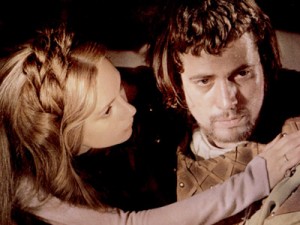
- do they seem like a couple in love? Do they support each other? Communicate? Are they available & affectionate?
- Are they motivated by the desire to protect each other & make each other happy? Or do they care about the other’s happiness at all?
- If they had behaved differently in this moment would things have been any different? Would their marriage have survived?
- From what point in the play was their marriage doomed? When did conflict & contempt morph into avoidance? Do they end up living under the same roof but leading separate lives? (The term “together but alone” springs to mind…)
PHASE ONE: from the prophesy up to the decision to kill Duncan.
[youtube_sc url=https://www.youtube.com/watch?v=Iatzg0J9wcQ]
They seem really close as a couple but there’s definitely some tension there. They seem to have differing opinions and values but vaulting ambition is one thing they definitely do have in common!
Key moments = analyse the LETTER Macbeth sends to his wife & look at her reaction, including her analysis of her husband’s personality.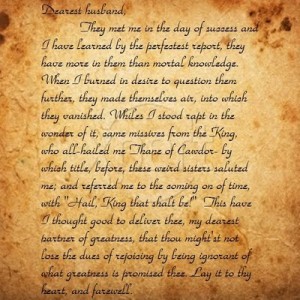 They obviously love each other dearly and tell each other everything. However, their value systems aren’t exactly in sync – she sees his conscience and morals as an obstacle, a weakness rather than as something to be admired and celebrated. See Act 1, scene 5.
They obviously love each other dearly and tell each other everything. However, their value systems aren’t exactly in sync – she sees his conscience and morals as an obstacle, a weakness rather than as something to be admired and celebrated. See Act 1, scene 5.
MANIPULATION – Lady Macbeth certainly shows contempt for her husband’s desire to “proceed no further in this business” but does she think she’s actually helping? or is she motivated purely by selfish ambition? You decide. She certainly goes to extreme lengths to change his mind but she does seem to genuinely fear that he’ll regret it forever (“and live a coward in thine own esteem“) if he doesn’t act now.See Act 1, scene 7.
PHASE TWO: immediate reaction to the crime and efforts to conceal their guilt.
[youtube_sc url=https://www.youtube.com/watch?v=ldbeR-CujwY]
Key moments = DAGGERS Lady Macbeth is furious with her husband for being so overwhelmed with shock and guilt that he brings the dagger out of Duncan’s chamber but she covers his tracks by returning to the scene of the crime. See Act 2, scene 2.
FAINT – Does she faint or does she fake a faint? It’s not clear. Perhaps she really faints because she’s genuinely shocked that her husband found it so easy to kill two more people (the chamberlains) and because the horror of what they’ve done suddenly hits home. Or perhaps Lady M feels her husband’s yet again not doing a good job of feigning innocence, particularly when he starts waffling on about killing the chamberlains. Perhaps she fake faints to protect her husband and draw attention away from him. See Act 2, scene 3.
PHASE THREE: before and during the banquet.
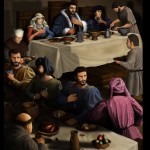 Key moments = REGRET – although brazen after the crime (“a little water clears us of this deed“) Lady M is now finally realising that “Nought’s had, all’s spent, where our desire is got without content” but in conversation with her husband she fakes nonchalance, pretending that everything’s fine. He confides in her, basically echoing exactly what she said in private moments before, but he doesn’t make plans with her anymore and he seems to have a more protective, almost patronising paternal attitude to her than he did at the start of the play (“be innocent of the knowledge dearest chuck…“). See Act 3, scene 2.
Key moments = REGRET – although brazen after the crime (“a little water clears us of this deed“) Lady M is now finally realising that “Nought’s had, all’s spent, where our desire is got without content” but in conversation with her husband she fakes nonchalance, pretending that everything’s fine. He confides in her, basically echoing exactly what she said in private moments before, but he doesn’t make plans with her anymore and he seems to have a more protective, almost patronising paternal attitude to her than he did at the start of the play (“be innocent of the knowledge dearest chuck…“). See Act 3, scene 2.
BANQUET = Macbeth basically has a breakdown in public – well it’s either a breakdown or a psychotic episode. Remember no-one else can see the ghost so Lady M is more than likely right when she observes “this is the very painting of your fear” (but not everyone would agree with me on this one!). Yet again it is left to her to conceal what her husband cannot; to make excuses publicly in order to protect them and their position on the throne; here again she is angry with him, asking the insulting question “are you a man” which echoes her earlier tirade (“when you durst do it then you were a man“) when she convinced him to kill Duncan in the first place. If you glance back at the discussion above of what causes problems in a marriage, you’ll notice that one warning sign is where couples keep having the same argument over and over again! See Act 3, scene 4.
[youtube_sc url=https://www.youtube.com/watch?v=op3YKU6I2m8]
PHASE 4: from the sleepwalking scene to the end of the play
Before we look at key moments, consider this. We don’t see them together on stage again. At all. Ever. The last direct conversation between them that we witness is the Banquet scene which is just over half way through the play. So the whole stonewalling thing where couples start to avoid each other because when they’re together it’s just too painful and difficult? Yeah, I think we can safely assume that that’s what’s going on here lads!
Key moments = SLEEPWALKING – if you want proof that their marriage is effectively over, here it is. She’s been driven insane with guilt and remorse and her husband is no-where to be found. She also seems to have heard rumours about what happened to Lady Macduff (“the thane of fife had a wife; where is she now?“) but again she has not been consulted. She seems frightened, possibly even terrified by what she and her husband have become. Perhaps there’s some poetic justice here – Macbeth felt alone in his remorse because every time he mentioned it to his wife she either ridiculed him or at the very least she discouraged him from dwelling on it (“these deeds must not be thought of after these ways; so it will make us mad“) always dismissing his worry and fear. Maybe she was just trying to protect him from his own conscience, but if she had allowed him to listen to his conscience in the first place, none of this would have happened, the silly cow! Now she’s facing the very same emotions alone and ironically her prediction that dwelling on their crimes would result in madness has come to pass. See Act 5, scene 1.
DOCTOR DOCTOR – instead of visiting his wife to see how she is, he visits her doctor, asking “how is your patient?” rather than “how is my wife”. Even in the phrasing of this question he seems to have washed his hands of her – she is the doctor’s problem now rather than her husband’s responsibility. Yes he cares enough to ask how she is and to order the doctor to do something; anything. But we get the impression that he has more pressing matters to attend to. She is not his first priority; she’s an afterthought. See Act 5, scene 3.
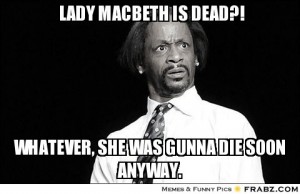 DEATH – his reaction to the news that “the Queen is dead” is pretty important. This is – or at least was – the love of his life. He doesn’t fall to the floor weeping. He doesn’t seem shocked or upset “she should have died hereafter“. But in his own way, he is overwhelmed so don’t take this meme at face value! It’s no accident that Macbeth’s most famous and haunting soliloquy is delivered immediately after he hears this news. Her death is just proof to him that life is a sick joke, a brief and brutal experience “full of sound and fury signifying nothing“. It is touching that he sees her life as a “brief candle” that has been snuffed out and his suicidal despair is at its most profound in this moment. See Act 5, scene 5. The only other mention of her death comes in the final scene (Act 5, scene 9) when Malcolm reveals that Lady M committed suicide. I don’t want for a moment to suggest that the spouse is to blame when their partner commits suicide; nor do I think that you can necessarily save someone from themselves when they have been lost to the horror of madness and depression. However, even if he had been with her, it’s unlikely that Macbeth would have been able to offer her any comfort, as he his presence would only have been rubbing salt in her wounds – after all her guilt at their crimes and at what they have become is what’s torturing her so Macbeth in person would be too painful a reminder of their unforgivable evil deeds.
DEATH – his reaction to the news that “the Queen is dead” is pretty important. This is – or at least was – the love of his life. He doesn’t fall to the floor weeping. He doesn’t seem shocked or upset “she should have died hereafter“. But in his own way, he is overwhelmed so don’t take this meme at face value! It’s no accident that Macbeth’s most famous and haunting soliloquy is delivered immediately after he hears this news. Her death is just proof to him that life is a sick joke, a brief and brutal experience “full of sound and fury signifying nothing“. It is touching that he sees her life as a “brief candle” that has been snuffed out and his suicidal despair is at its most profound in this moment. See Act 5, scene 5. The only other mention of her death comes in the final scene (Act 5, scene 9) when Malcolm reveals that Lady M committed suicide. I don’t want for a moment to suggest that the spouse is to blame when their partner commits suicide; nor do I think that you can necessarily save someone from themselves when they have been lost to the horror of madness and depression. However, even if he had been with her, it’s unlikely that Macbeth would have been able to offer her any comfort, as he his presence would only have been rubbing salt in her wounds – after all her guilt at their crimes and at what they have become is what’s torturing her so Macbeth in person would be too painful a reminder of their unforgivable evil deeds.

